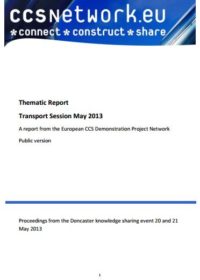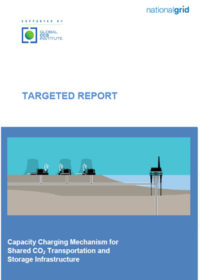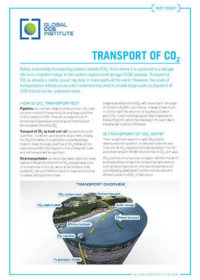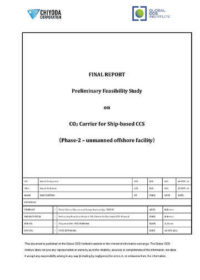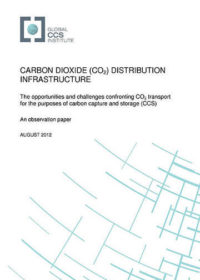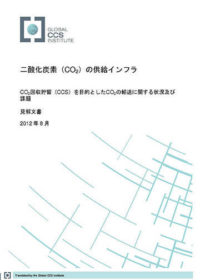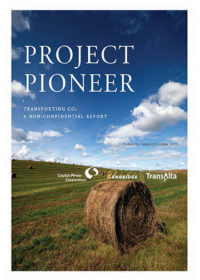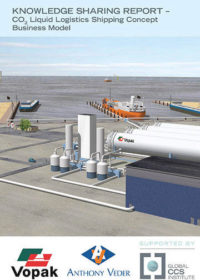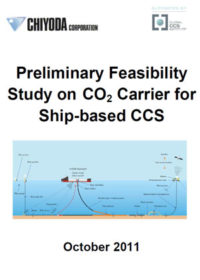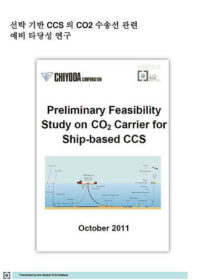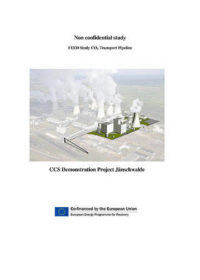Resources
Publications
Our publications, reports and research library hosts over 500 specialist reports and research papers on all topics associated with CCS.
View our Publication Library Disclaimer.
Filter by
This report presents the discussions, conclusions and actions agreed at the first thematic workshop on CO2 transportation by the European CCS Demonstration Project Network, which was held at Doncaster, and hosted by the Don Valley Power Project (UK) on 20-21 May 2012.
Disclaimer
The content within the Global CCS Institute Publications, Reports and Research Library is provided for information purposes only. We make every effort and take reasonable care to keep the content of this section up-to-date and error-free. However, we make no claim as to its accuracy, currency or reliability.
Content and material featured within this section of our website includes reports and research published by third parties. The content and material may include opinions and recommendations of third parties that do not reflect those held by the Global CCS Institute.
Capacity charging mechanism for shared CO2 transportation and storage infrastructure
5th May 2013
Topic(s): Carbon capture use and storage (CCUS), CO2 storage, CO2 transport
Technical and legal barriers to CCS and risks associated with the technology are diminishing. A serious obstacle to growth of the CCS industry, however, is difficulty in building a sound commercial case for the development and operation of CCS infrastructure. One way to significantly reduce the cost of CCS is to realise economies of scale by sharing a single CO2 transportation and storage infrastructure system among several operators of separate CO2 generating plants.
This report, prepared by National Grid Carbon (UK), sets out a commercial charging mechanism for the development of, access to, and subsequent use of a shared CCS infrastructure system. The study also explored a number of options for allocating the proportion of system development and operational costs between members of a shared CCS infrastructure.
Disclaimer
The content within the Global CCS Institute Publications, Reports and Research Library is provided for information purposes only. We make every effort and take reasonable care to keep the content of this section up-to-date and error-free. However, we make no claim as to its accuracy, currency or reliability.
Content and material featured within this section of our website includes reports and research published by third parties. The content and material may include opinions and recommendations of third parties that do not reflect those held by the Global CCS Institute.
Transport of CO2
1st March 2013
Topic(s): Carbon capture use and storage (CCUS), CO2 transport, Health safety and environment
Disclaimer
The content within the Global CCS Institute Publications, Reports and Research Library is provided for information purposes only. We make every effort and take reasonable care to keep the content of this section up-to-date and error-free. However, we make no claim as to its accuracy, currency or reliability.
Content and material featured within this section of our website includes reports and research published by third parties. The content and material may include opinions and recommendations of third parties that do not reflect those held by the Global CCS Institute.
Preliminary feasibility study on CO2 carrier for ship-based CCS. Phase 2: unmanned offshore facility
30th November 2012
Topic(s): Carbon capture use and storage (CCUS), CO2 transport
Disclaimer
The content within the Global CCS Institute Publications, Reports and Research Library is provided for information purposes only. We make every effort and take reasonable care to keep the content of this section up-to-date and error-free. However, we make no claim as to its accuracy, currency or reliability.
Content and material featured within this section of our website includes reports and research published by third parties. The content and material may include opinions and recommendations of third parties that do not reflect those held by the Global CCS Institute.
Legislation relating to CO2 transport for storage
30th August 2012
Topic(s): Carbon capture use and storage (CCUS), CO2 storage, CO2 transport, Liability, Permitting, Policy law and regulation
Here we consider the legal implications of transporting CO2 across international boundaries, for storage in marine environments, and more specifically, how CO2 transport for storage is dealt with in the European, UK and Canadian contexts.
1. International transboundary transport regulation for CO2 storage
Transport of CO2 is necessary when a suitable storage site is not close to the capture installation. During the transport phase, international law is relevant when CO2 crosses the territory of different states in order to reach the storage site. The Bamako Convention and the Basel Convention address this issue:
2. CO2 transport for storage and international marine legislation
International marine legislation has an impact upon the legal conditions for development of CCS offshore:
3. European and regional legislation on CO2 transport and storage
In a regional context, such as the European Union, transnational regulation of the transport phase is essential when CO2 is transported across the territory of different Member States in order to reach a storage site. The following legislation covers this:
4. UK laws regulating CO2 transport for storage
In the UK at present no legislation that expressly regulates CO2 transport by pipeline. The Health and Safety Executive (HSE) and the Department of Energy and Climate Change (DECC) have suggested CO2 be classified as a 'dangerous substance' or a 'dangerous fluid' and legislated accordingly.
5. Canadian laws regulating CO2 transport for storage
In Canada, there is no dedicated legislation regarding CO2 pipelines, either at federal or provincial level. Existing CO2 pipelines operate for the purpose of enhanced oil recovery (EOR) or acid gas disposal and are covered by existing pipeline legislation.
Disclaimer
The content within the Global CCS Institute Publications, Reports and Research Library is provided for information purposes only. We make every effort and take reasonable care to keep the content of this section up-to-date and error-free. However, we make no claim as to its accuracy, currency or reliability.
Content and material featured within this section of our website includes reports and research published by third parties. The content and material may include opinions and recommendations of third parties that do not reflect those held by the Global CCS Institute.
Carbon dioxide (CO2) distribution infrastructure
23rd August 2012
Topic(s): Carbon capture use and storage (CCUS), CO2 hubs, CO2 transport
Disclaimer
The content within the Global CCS Institute Publications, Reports and Research Library is provided for information purposes only. We make every effort and take reasonable care to keep the content of this section up-to-date and error-free. However, we make no claim as to its accuracy, currency or reliability.
Content and material featured within this section of our website includes reports and research published by third parties. The content and material may include opinions and recommendations of third parties that do not reflect those held by the Global CCS Institute.
二酸化炭素(CO2)の供給インフラCO2回収貯留(CCS)を目的としたCO2の輸送に関する状況及び課題見解文書
1st August 2012
Topic(s): Carbon capture use and storage (CCUS), CO2 hubs, CO2 transport
本文書は、CO2回収貯留(CCS: Carbon Capture and Storage)に利用されるCO2(二酸化炭素)の供給インフラ(ネットワーク)に関して、公的に入手可能である査読付き研究論文からいくつかを選択し、専門知識がなくとも理解できる要約として提供することを目的とする。
本文書は、主にパイプラインによるCO2の輸送に注目する。公的に入手可能な文献のほとんどによれば、今後数十年のうちに回収及び貯留しなければならないと考えられる数十億トンのCO2の大半を輸送する手法でもっとも有力なものはパイプラインである。気候変動が危険な水準に至ることを回避しうるCO2収支(温室効果ガスの許容排出量)を維持するという国際社会の流れの中で、この規模の緩和措置は必要不可欠であると考えられている。
本文書では、CO2の回収及び貯留の手法については特に言及していない。しかし、十分かつ確実なCO2の排出源はもとより、十分かつ厳重で、安全に利用できる長期的な貯留方法がない限り、CO2が相当規模にて輸送されることはないと認識している。したがって、こうした活動には、所有権、長期的な義務に関する適切な規制、サイトの監視・測定・検証(MMV:monitoring, measurement and verification)及びCCSチェーン全体における効果的なコンプライアンス制度の確立が今後必要になるであろう。
Disclaimer
The content within the Global CCS Institute Publications, Reports and Research Library is provided for information purposes only. We make every effort and take reasonable care to keep the content of this section up-to-date and error-free. However, we make no claim as to its accuracy, currency or reliability.
Content and material featured within this section of our website includes reports and research published by third parties. The content and material may include opinions and recommendations of third parties that do not reflect those held by the Global CCS Institute.
Project Pioneer. Transporting CO2: a non-confidential report
14th June 2012
Topic(s): Carbon capture use and storage (CCUS), CO2 transport
This report discusses the basics of CO2 transportation and delves deeper into the design and safety considerations of the two pipelines systems that were proposed for Project Pioneer. Project Pioneer was intended to be among the world's largest, fully-integrated carbon capture and storage (CCS) systems. The CO2 was to be transported for enhanced oil recovery (EOR) in nearby oil fields as well as for permanent storage in deep saline formations.
The report also explores lessons learnt from existing CO2 pipelines that are used elsewhere.
Disclaimer
The content within the Global CCS Institute Publications, Reports and Research Library is provided for information purposes only. We make every effort and take reasonable care to keep the content of this section up-to-date and error-free. However, we make no claim as to its accuracy, currency or reliability.
Content and material featured within this section of our website includes reports and research published by third parties. The content and material may include opinions and recommendations of third parties that do not reflect those held by the Global CCS Institute.
Knowledge sharing report. CO2 liquid logistics shipping concept: business model
18th November 2011
Topic(s): Carbon capture use and storage (CCUS), CO2 hubs, CO2 transport
With the different CCS logistical chain components identified and the high number of emitters in the Rotterdam area, the companies Vopak, Anthony Veder, Air Liquide and Gasunie joined forces in a joint venture called Carbon In Transport (De Rotterdamse CINTRA Maatschappij BV, or CINTRA) to provide a fully-integrated CCS transportation solution – for both emitters and storage providers.
To support the early deployment of CCS in Rotterdam and the development of a Rotterdam CCS Network, the Global CCS Institute supported Vopak and Anthony Veder to conduct a feasibility study on their CO2 liquid logistics shipping concept that will provide emitters with a complete logistical transportation solution for captured CO2 from their site to an offshore storage location.
In this report business principles for the liquid logistics shipping concept are elaborated upon and a rationale on how this business model can be rolled out further is provided. In addition, the transportation costs for the various shipping and pipeline routes are compared.
Disclaimer
The content within the Global CCS Institute Publications, Reports and Research Library is provided for information purposes only. We make every effort and take reasonable care to keep the content of this section up-to-date and error-free. However, we make no claim as to its accuracy, currency or reliability.
Content and material featured within this section of our website includes reports and research published by third parties. The content and material may include opinions and recommendations of third parties that do not reflect those held by the Global CCS Institute.
Preliminary feasibility study on CO2 carrier for ship-based CCS
31st October 2011
Topic(s): Carbon capture use and storage (CCUS), CO2 transport
This report from Chiyoda Corporation covers a technical pre-feasibility study of shuttle type CO2 ship transport, the engineering design of ship equipment and injection method suitable for offshore operations, and goes further on to discuss the regulatory considerations for ship-based CO2 transport and injection.
Many regions will be unable to secure suitable onshore CO2 storage and that this will be the major barrier to the deployment of domestic CCS. Shipping CO2 to a suitable offshore site via smaller shuttle tanks could provide an economical alternative to long distance seabed pipeline transportation.
The Project Leader for the study is Professor Masahiko Ozaki, who was the lead author on the IPCC Special Report on CCS -Chapter on CO2 Shipping Transportation.
Disclaimer
The content within the Global CCS Institute Publications, Reports and Research Library is provided for information purposes only. We make every effort and take reasonable care to keep the content of this section up-to-date and error-free. However, we make no claim as to its accuracy, currency or reliability.
Content and material featured within this section of our website includes reports and research published by third parties. The content and material may include opinions and recommendations of third parties that do not reflect those held by the Global CCS Institute.
선박 기반 CCS의 CO2 수송선 관련 예비 타당성 연구
1st October 2011
Topic(s): Carbon capture use and storage (CCUS), CO2 transport
본 보고서는 치요다社의 CO2 수송선 기술 관련 예비 타당성 연구에 대해 다루며, 해양지중 운영에 있어서 선박 설비의 엔지니어링 설계 및 주입 방식, 더 나아가 CO2 수송선 및 주입에 관한 규제와 고려사항에 대해 논의한다. 육상 부지에 대한 CO2 저장의 적합성을 보장하기 어렵다는 점은 일본 내 CCS 보급에 있어서 주요 장벽이 될 것이다. 보다 작은 규모의 셔틀 탱크를 이용하여 CO2를 적합한 해양지중 부지로 선박 수송하는 방식은 장거리 해저 파이프라인 수송에 대한 경제적 대안이 될 수 있다.
Disclaimer
The content within the Global CCS Institute Publications, Reports and Research Library is provided for information purposes only. We make every effort and take reasonable care to keep the content of this section up-to-date and error-free. However, we make no claim as to its accuracy, currency or reliability.
Content and material featured within this section of our website includes reports and research published by third parties. The content and material may include opinions and recommendations of third parties that do not reflect those held by the Global CCS Institute.
FEED study CO2 transport pipeline: CCS Demonstration Project Jänschwalde. Non confidential study.
30th September 2011
Topic(s): Carbon capture use and storage (CCUS), CO2 transport, Engineering and project delivery
Disclaimer
The content within the Global CCS Institute Publications, Reports and Research Library is provided for information purposes only. We make every effort and take reasonable care to keep the content of this section up-to-date and error-free. However, we make no claim as to its accuracy, currency or reliability.
Content and material featured within this section of our website includes reports and research published by third parties. The content and material may include opinions and recommendations of third parties that do not reflect those held by the Global CCS Institute.
